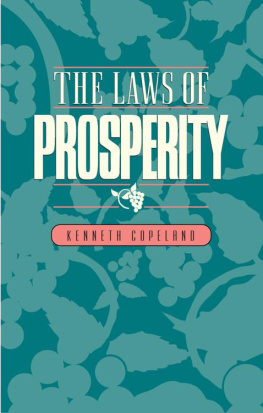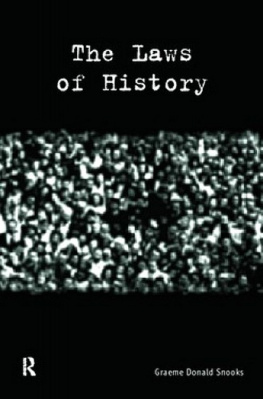Paulhan - The Laws of Feeling
Here you can read online Paulhan - The Laws of Feeling full text of the book (entire story) in english for free. Download pdf and epub, get meaning, cover and reviews about this ebook. publisher: Routledge, genre: Science. Description of the work, (preface) as well as reviews are available. Best literature library LitArk.com created for fans of good reading and offers a wide selection of genres:
Romance novel
Science fiction
Adventure
Detective
Science
History
Home and family
Prose
Art
Politics
Computer
Non-fiction
Religion
Business
Children
Humor
Choose a favorite category and find really read worthwhile books. Enjoy immersion in the world of imagination, feel the emotions of the characters or learn something new for yourself, make an fascinating discovery.
The Laws of Feeling: summary, description and annotation
We offer to read an annotation, description, summary or preface (depends on what the author of the book "The Laws of Feeling" wrote himself). If you haven't found the necessary information about the book — write in the comments, we will try to find it.
The Laws of Feeling — read online for free the complete book (whole text) full work
Below is the text of the book, divided by pages. System saving the place of the last page read, allows you to conveniently read the book "The Laws of Feeling" online for free, without having to search again every time where you left off. Put a bookmark, and you can go to the page where you finished reading at any time.
Font size:
Interval:
Bookmark:


PHYSIOLOGICAL PSYCHOLOGY
In 10 Volumes
I | Pleasure and Instinct | Allen |
II | Pleasure and Pain | Bousfield |
III | The Neural Basis of Thought | Campion et al |
IV | Body and Mature Behaviour | Feldenkrais |
V | Emotions of Normal People | Marston et al |
VI | Integrative Psychology | Marston et al |
VII | The Development of the Sexual Impulses | Money-Kyrle |
VIII | The Laws of Feeling | Paulhan |
IX | Thought and the Brain | Piron |
X | The Image and Appearance of the Human Body | Schilder |

First published in 1930
by Routledge, Trench, Trubner & Co., Ltd.
Transferred to Digital Printing 2007
Routledge is an imprint of the Taylor & Francis Group
1930 F Paulhan, Translated by C K Ogden
All rights reserved. No part of this book may be reprinted or reproduced
or utilized in any form or by any electronic, mechanical, or other means,
now known or hereafter invented, including photocopying
and recording, or in any information storage or retrieval system, without
permission in writing from the publishers.
The publishers have made every effort to contact authors/copyright holders
of the works reprinted in the International Library of Psychology.
This has not been possible in every case, however, and we would welcome correspondence from those individuals/companies
we have been unable to trace.
These reprints are taken from original copies of each book. In many cases
the condition of these originals is not perfect. The publisher has gone to
great lengths to ensure the quality of these reprints, but wishes to point
out that certain characteristics of the original copies will, of necessity, be
apparent in reprints thereof.
British Library Cataloguing in Publication Data
A CIP catalogue record for this book
is available from the British Library
The Laws of Feeling
ISBN 9781-13633-7-727
ISBN 978-1-1363-3772-7 (ePub)
Physiological Psychology: 10 Volumes
ISBN 9781-13633-7-727
The International Library of Psychology: 204 Volumes
ISBN 9781-13633-7-727
THOUGH it cannot be said that the writings of Frdric Paulhan are entirely unknown outside France, references to his name in English publications are few and far between. Already, however, before the War he had been responsible for more than a dozen major works, and in 1928-9 his latest treatises, Les Puissances de t Abstraction and La Double Fonction du Langage, completed a twenty-volume programme whose main features were determined over sixty years ago.
Paulhan, in fact, has been one of the leading figures in contemporary psychology for over half-a-century. So early as 1877 he began to contribute important articles to the Revue Philosophique. In 1880 appeared his Physiologie de I'Esprit, in which year Ribot referred to his original treatment of emotion, and expressed his general agreement with Paulhans views.The original of the present volume was first published in 1884 in the Revue Philosophique under the title Les phnomnes affectifs, et les lois de leur apparition. It was enlarged in book form in 1887. A second edition was called for in 1901, and a third in 1912, but for many years before the fourth edition appeared (1926) it remained, like so much of the best French psychology, out of print and unobtainable. There is no copy in the Bodleian, the London University Library, the London Library, the Science Museum Library, or the Psychological Library at Cambridge. The edition of 1901 may, however, be found in the British Museum and that of 1887 in the Cambridge University Library. This work has here been supplemented, with his consent, by M. Paulhans contribution to the Revue Philosophique (July-August, 1920, Nos. 7-8) entitled La sensibilit, Pintelligence et la volont dans tous les faits psychologiques.
The translation itself was begun at a time when the challenge of Endocrinology, Behaviorism, and the various branches of Comparative Physiology, no less than the successful advance of Psycho-analysis, made it seem doubtful to many whether psychology ought not shortly to dispense with psychologists, in the traditional sense, altogether. It was therefore laid circumspectly aside until, after a lapse of ten years, it became clear that the more advanced members of a variety of schools were converging on a formulation closely resembling that to which so much thought had already been given by others of whose very existence they were presumably unaware.
Moreover, if it be true, as Professor Lashley told the Ninth International Congress of Psychology (1929), that psychology is to-day a more fundamental science For the modern psychologist, however, the problem of emotion is still in such confusion that one can draw no conclusions with confidence.
Paulhans main thesis, that feeling and emotion are due to an arrest of tendencies, may be related historically to the suggestions of Bain and Maudsley to which reference is made on pages 24 and 44. The treatment of emotion as due to the overflow consequent on this arrest may to-day commend itself to many who would hesitate to extend it to the whole affective field. Paulhans generalization of the law to cover all forms of feeling, including both pleasure and pain as he defines them (pp. 19 and 82), is implicit in the very broad bio-physical conception of man as an un-adapted animal (p. 191) which also underlies his theory of consciousness (p. 10) and personality (p. 144).
That such an approach to psychological phenomena, whatever its ultimate validity, may be fruitful in the development of new lines of thought is shown by reference to other works in the Library of Psychology. Thus the reader of Vaihingers Philosophy of As-if will find {infra pp. 176-9) a full awareness of the heuristic value of error, while Professor Thurstones account of The Nature of Intelligence and Rignanos explanation of rational and representative processes in his Psychology of Reasoning are foreshadowed in the discussions of the selective character of intelligence (p. in) and its adaptive, experimental function (p. 176) respectively. The main contention of those who adopt the Gestalt terminology will be recognized in the account of the relation of a feeling to its constituent parts (pp. 132-4), while material for a sane development of Behaviorism might have been derived from the remarks on observation and introspection at page 11. Moreover, since the first great disturbance of equilibrium, and the first arrest of the fundamental tendency of the organism thereto, is due to The Trauma of Birth, even the speculations of Dr Rank might have found an impressive setting in a theory which accounts so plausibly both for Anxiety and for Excitement. Psycho-analysis in general may also profit by the neutral treatment of Adaptation and Adjustment; on page 95, for example, will be found an account of organic disturbance due to emotional conflict, successfully freed (cf. p. 144) from the moral and political interpretations to which the neo-Adlerian movement is so naively prone.
Font size:
Interval:
Bookmark:
Similar books «The Laws of Feeling»
Look at similar books to The Laws of Feeling. We have selected literature similar in name and meaning in the hope of providing readers with more options to find new, interesting, not yet read works.
Discussion, reviews of the book The Laws of Feeling and just readers' own opinions. Leave your comments, write what you think about the work, its meaning or the main characters. Specify what exactly you liked and what you didn't like, and why you think so.

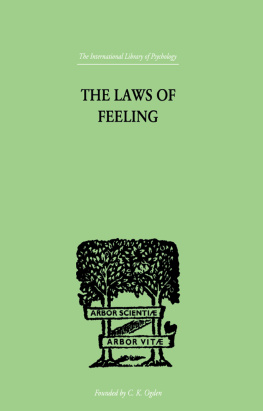




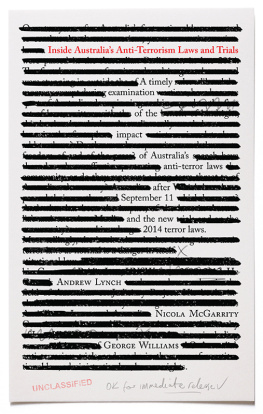
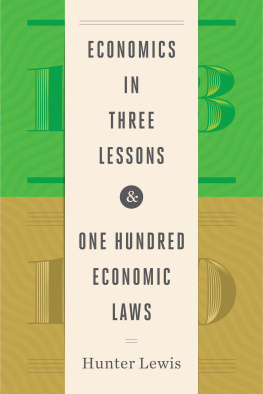

![Oldroyd Jennifer - Applying the 7 laws of spiritual success: [workbook]](/uploads/posts/book/136775/thumbs/oldroyd-jennifer-applying-the-7-laws-of-spiritual.jpg)

